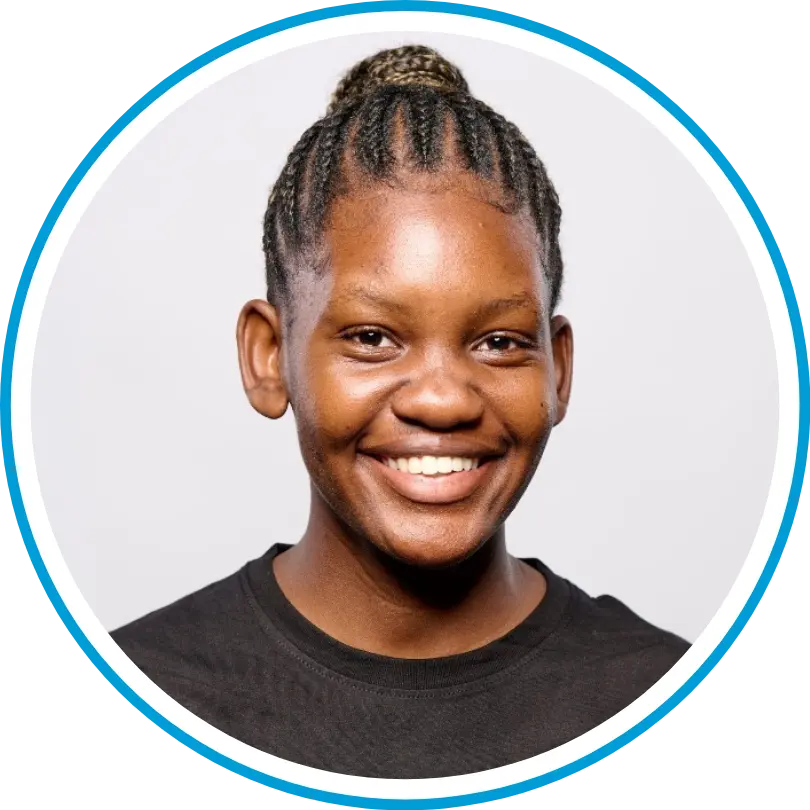Neza Cilunda
Neza Cilunda is a medical student and digital health innovator from Namibia, dedicated to improving maternal health outcomes through inclusive technology. As the founder of Mama+ Care, she is developing a multilingual mobile health platform that empowers rural women with accessible, life-saving health information. Neza’s work bridges digital development and gender equity, ensuring no woman is left behind in Namibia’s healthcare transformation.

What does your work focus on?
As a medical student deeply passionate about maternal health and gender equality, my work focuses on developing Mama+ Care, a digital health initiative aimed at improving maternal and child healthcare in rural Namibia. This initiative addresses key barriers faced by rural mothers—including limited healthcare knowledge, poor access to services, and misinformation, which often lead to high rates of home births and missed vaccinations. By leveraging digital technology, Mama+ Care bridges these gaps and promotes both digital development and gender equality in healthcare.
Mama+ Care is a multilingual, mobile health companion designed to reach rural mothers, using both smartphone apps and USSD/SMS-based features to accommodate women with different levels of technology access. It offers essential health reminders for prenatal check-ups, childbirth preparation, and vaccination schedules, ensuring that mothers receive timely notifications even in remote areas. AI-powered predictive analytics provide personalized health advice based on reported symptoms, offering guidance when professional care is out of reach.
The app is designed for both smartphones and basic mobile phones, ensuring that all women (regardless of their device) can benefit. This inclusive approach bridges the digital divide and extends maternal healthcare access to even the most underserved communities.
Mama+ Care contributes to gender equality by addressing maternal health through a gender-responsive and culturally sensitive lens. It provides access to vital health information in five indigenous languages, Oshiwambo, Otjiherero, Nama/Damara, Rukwangali, and Silozi, to ensure that women can understand and act on critical guidance in their preferred language. This reduces language barriers and empowers women to make informed decisions about their own health and that of their children. The app offers proactive features such as health reminders, symptom tracking, and early doctor visit recommendations, helping reduce risks associated with home births and inadequate prenatal care. A “Call for Help” button connects users to the nearest health facility or community health worker, providing immediate access to emergency care, which is particularly valuable for rural women facing transportation and distance challenges.
By placing women at the center of technological innovation in maternal healthcare, Mama+ Care helps close the gender gap in digital health and equips women with the tools and knowledge to improve their lives and outcomes for their families.
What is the impact and scalability?
Mama+ Care addresses critical maternal and child health issues in rural Namibia by offering a multilingual mobile platform with health reminders, education, and symptom tracking. Mothers receive alerts for prenatal appointments, vaccination schedules, and pregnancy danger signs. This timely, preventive care contributes to reducing maternal mortality and improving child health outcomes in remote regions.
The AI-powered symptom checker helps mothers report concerns and receive advice on whether to seek medical help or follow self-care. This empowers them to make informed health decisions, especially in areas with limited healthcare access. Education on pregnancy, harmful practices, and newborn care is delivered through videos, audio, and SMS—ensuring accessibility for users with low literacy. USSD/SMS functions ensure that even mothers without smartphones can use the app.
Scalability is a key strength. Mama+ Care can expand to other Namibian regions and adapt to other African countries with similar maternal health challenges. Future plans include integration with national health systems for vaccination tracking, mental health support, telemedicine capabilities, and data collection for public health policy. With NGO and government partnerships, Mama+ Care could become a cost-effective, scalable solution to drive digital transformation in maternal health across Africa.

What does being selected as an ITU160 Gender Champion mean to you, and how will you use this platform?
As a medical student in Namibia, I have witnessed firsthand the disparities in healthcare access, especially for women in rural areas. My initiative, Mama+ Care, was born from the desire to bridge these gaps through digital health solutions tailored to mothers’ real needs. Being selected as an ITU160 Gender Champion would allow me to amplify this work and drive meaningful change at a larger scale, across both health and digital innovation spaces.
As a Gender Champion, I would have the opportunity to connect with global leaders and experts in gender equality and digital development. This exposure would allow me to learn from successful initiatives and apply those lessons to improve Mama+ Care. The ITU160 platform would strengthen my ability to advocate for gender-responsive innovation—ensuring women’s needs, voices, and rights are central to digital transformation efforts.
Gender equality in digital transformation is close to my heart because I believe that women’s participation in the tech and digital spaces is crucial for inclusive development. Women in developing countries often face systemic barriers to accessing digital tools, education, and leadership roles. I am committed to shifting that narrative by promoting digital literacy, expanding access to health education, and advocating for policies that create equal opportunities.
With the ITU160 platform, I will collaborate with like-minded individuals and organizations to scale projects that improve maternal health, empower women, and foster inclusive, technology-driven development in underserved communities.